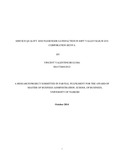| dc.description.abstract | According to World Bank study (2009), by 1990s most of the African railways were in poor
shape requiring large investments in infrastructure and rolling stock, and a new business oriented
approach to their activities. To address the crisis, many governments considered concessions as a
possible solution, and between the mid 1990s and 2009 most of the sub-Saharan railways were
concessioned. In Kenya, Railway operations were concenssioned to Rift Valley railways in 2006
for a period of 25 years for freight and 6 years, later reviewed to 7 years for passenger.
Since concession, there has been a decline in the number of passengers in Kenya. RVR was transporting
7.28 Million passengers by year 2013 compared 7.92 million passengers (decline by 8%) before
concession in the year 2006 (Economic Survey Report, 2013). The major challenges facing the railway
industry in Kenya that affects its capability to offer quality service to passengers includes adverse
conditions of operating railway transport services including obsolete, non-functional infrastructure;
reduced connectivity between the countries in the region; very low traffic for the existing railway
network; unsatisfactory agreements for operating passenger transport services with negative impact on the
financial stability of operators and lack of resources to finance the maintenance and rehabilitation of
infrastructure (World Bank, 2009).
This study sought to find out what service quality attributes passenger value and how much they were
satisfied, a questionnaire consisting of 36 statements that were grouped and related to one of the eight
service quality dimensions of the SERVQUAL model were administered to 90 passengers, 60 responded
(66.67%). Majority respondents expectations were high with mean score 4.76 while majority lowly
perceived serviced offered with mean score 2.44. Only 3.4% of passengers were satisfied with SQ.
Attributes to do with seating space, Comfort, On-time delivery, Frequency of Trains as scheduled
received lower ratings. The management should be carrying out satisfaction reviews to know exactly what
customers really value and restructure their processes to deliver on those attributes prioritizing those that
customers are very dissatisfied on. | en_US |

